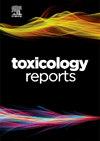Neurotoxicity associated with the medicinal mushroom product-Diamond Shruumz: A case report
Q1 Environmental Science
引用次数: 0
Abstract
Medicinal mushrooms are widely available as health supplements, and the federal government does not currently require these products to be examined for quality and contents. This places consumers at risk for unintentional ingestion of other substances, including toxic mushroom species. We describe a case report of an ingestion of an edible medicinal mushroom product likely contaminated with muscimol, the primary toxin of Amanita muscaria. A 17-year-old female presented with altered mental status, mydriasis, salivation, and myoclonic jerks that were refractory to benzodiazepines. She was intubated for airway protection and had spontaneous improvement of all her symptoms with return to baseline within 8 hours of presentation. She disclosed ingestion of the chocolate bar brand “Diamond Shruumz” that has been recalled for muscimol contamination. She was discharged home the day after presentation without symptom recurrence. This case displays the toxidrome of muscimol ingestion consistent with prior reports in the literature from muscimol containing mushroom ingestion. To our knowledge, this is among the first reports of Amanita muscaria ingestion from a commercially available medicinal mushroom product.
与药用蘑菇产品--Diamond Shruumz 相关的神经毒性:病例报告
药用蘑菇作为保健品广泛存在,联邦政府目前并未要求对这些产品的质量和含量进行检查。这就使消费者面临无意摄入其他物质(包括有毒蘑菇物种)的风险。我们描述了一例食用药用蘑菇产品可能被麝香草酚污染的病例报告,麝香草酚是姬松茸的主要毒素。一名 17 岁女性出现精神状态改变、瞳孔散大、流涎和肌阵挛抽搐,苯二氮卓类药物对其无效。她被插管以保护气道,所有症状在发病后 8 小时内自发改善并恢复到基线水平。她透露曾食用过因麝香草酚污染而被召回的 "Diamond Shruumz "牌巧克力棒。她在发病第二天就出院回家了,症状没有复发。该病例显示出摄入麝香草酚的中毒症状,这与之前文献中关于摄入含麝香草酚的蘑菇的报道一致。据我们所知,这是首例从市售药用蘑菇产品中摄入蕈蝇伞的报告。
本文章由计算机程序翻译,如有差异,请以英文原文为准。
求助全文
约1分钟内获得全文
求助全文
来源期刊

Toxicology Reports
Environmental Science-Health, Toxicology and Mutagenesis
CiteScore
7.60
自引率
0.00%
发文量
228
审稿时长
11 weeks
 求助内容:
求助内容: 应助结果提醒方式:
应助结果提醒方式:


